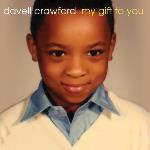 Buy on Amazon
Buy on Amazon
Davell Crawford often gets called the “Piano Prince of New Orleans,” but that usually isn’t meant in the Purple Rain sense. But it’s hard to think of a better parallel on Crawford’s first studio album in more than a decade: Few other artists this side of Prince are more eclectic, more erratically brilliant and more tough to pin down.
This 75-minute disc is at various times a New Orleans R&B album, a Creole roots disc, a bunch of collaborations, a set of sophisticated pop, and a collection of unlikely singer/songwriter covers; and it doesn’t even cover everything Crawford can do (there’s none of the B3-driven jazz-funk to which he devoted a ’90s album). The first left curve is the opening “Creole Man”—a track he’s performed live, but not quite in this style. Layered full of percussion, Indian chants and keyboards, it sounds less like Louisiana and more like vintage Peter Gabriel. The textured production continues through a version of “Junco Partner” that’s at least half the tempo of any you’ve ever heard—but the junkie-like pace does suit the lyrics better than the more familiar swaggering versions.
Then come the covers, another left turn considering the non-funky sources (including Billy Joel, James Taylor and Steve Winwood) and the shift to a bare-bones, piano-driven production. “Fire & Rain” gets a brief, eloquent trumpet solo from Nicholas Payton and an emotive Crawford vocal; the only question is whether the world really needs another version of this chestnut. Ditto Joel’s “River of Dreams,” though once again the vocal and the guest solo (this time Donald Harrison, Jr. on sax) are more than fine. Combining Allen Toussaint and Jimmy Cliff, “Southern Nights/Many Rivers to Cross” is less a traditional medley than an impressionistic piano solo that weaves variations on both tunes.
But the album still isn’t half over, and it’s time for another diversion: “Don’t Ever Be Blue” is Crawford’s first (and on this album, only) fling with country music, complete with Steve Riley on fiddle—and it’s a gem, up there with Aaron Neville’s country covers. With “Southern Girl” and “Southern Woman”—yes, those two songs are back-to-back—Crawford finally gets into the funky R&B that’s always been the ace up his sleeve; his high register is especially sweet on the former. And the twists keep coming: Dr. John takes the vocal on “Going Back to Louisiana,” which is so stamped with his personality and style that it sounds as if it wandered in from another album.
It could only end with another surprise and sure enough, the orchestrated ballad “Ode to Louisiana” is delivered like a Broadway showstopper. But maybe all that diversity is the real Davell Crawford, cocky enough to show he can do it all.




